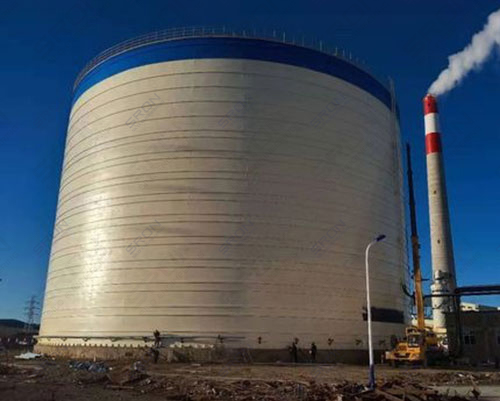Fly Ash Steel Silo for Sale
With the development of the thermal power industry, the discharge of fly ash in coal-fired power plants is increasing year by year. In order to meet the market demand for comprehensive utilization of fly ash and avoid pollution to the environment, the demand for large-scale fly ash steel silos also increases. There are two main ways to store fly ash: one is to increase the number of steel silos, and the other is to increase the volume of a single silo. Since increasing the number of steel silos will increase the occupied area and complicate the feeding and unloading process, increasing the volume of a single silo is the most economical and effective method. As the volume of the silo increases, the difficulty of its construction also increases accordingly.
Fly Ash Steel Silo Introduction
Large fly ash steel silo is composed of four parts: silo foundation, silo body, discharge system and automatic control system. According to the different structure of steel silo, it can be divided into spiral type, welded type and bolted type. The following mainly introduces welded steel silo and spiral steel silo.
Welded Steel Silo
Welded steel silo is directly welded by steel plates with different thicknesses. Generally, welded steel silos have fixed requirements. At present, the largest single storage capacity of SRON silo that has been put into production can reach 50,000 tons. The parameters of welded steel silos can be designed according to site requirements, its overall design has a strong correspondence, and its construction period is relatively long.
Spiral Steel Silo
The overall construction of spiral steel silo is relatively simple and can be directly constructed on site. The silo body is installed on the ground first, and then the silo body is lifted by the tower crane. In the actual construction process, there is no need to use scaffolding, and the overall construction period is short. The whole process of spiral steel silo is made of high-quality galvanized steel sheets. After completion, it generally does not need to be painted again, and the subsequent maintenance costs are relatively low.
Features of SRON Fly Ash Steel Silo
1.Large storage capacity: the capacity of a single silo is 10,000 to 50,000 tons, and a storage silo group with a larger capacity can be formed.
2.Convenient feeding: According to different materials and factory conditions, We can use elevator, chute or pneumatic pipeline for feeding.
3.Advanced Unloading: The steel silo system uses a new pneumatic unloading system, which relies on pneumatic pressure to transport bulk materials in steel silo to the designated location.
4. Low initial investment: Due to the adoption of multiple patented technologies, the use of steel silo system can not only save about 50% of building materials, but also save more than 60% of land.
5. Safety and reliability: With the patented vacuum sealing technology, the physical indicators of the fly ash will basically remain unchanged within 9 months. Stored for more than 18 months, except for a slight extension of the coagulation time and a slight decrease in the bending resistance, other indicators remain basically unchanged.
6. Energy saving and environmental protection: the patented dust removal technology is adopted in the process of feeding and unloading, which will not cause pollution to the surrounding environment.
7. Wide usage: the large steel silo can not only be used for cement and fly ash storage, but also can store chemical raw materials, grain, feed, etc.
Precautions When Using Fly Ash Steel Silo
(1)Before feeding, the Roots blower and the dust collector on the top of the silo should be turned on to supply air to the silo to circulate the air to dry the fluidized rod breathable fabric, and at the same time, it can take away the moisture in the silo to prevent the material from being damp and hardened at the bottom of the steel silo.
(2)Before feeding, check whether the valve of the inflatable pipeline is flexible and whether the switch state meets the process requirements; the inflatable pipeline should be purged to ensure that there are no welding slag and other debris; all garbage in the silo and in the material guide pipe should be cleaned up.
(3)Make sure that the dust collector on the top of the silo is turned on when feeding materials. Before starting the dust collector on the top of the silo, check the breathing valve on the top of the silo to ensure that the fan of the dust collector can be turned on when it is unblocked, so as to prevent the silo from being sucked and deformed.
(4)In order to ensure the normal operation of the steel silo, the moisture content of the incoming materials should be strictly controlled not to exceed 0.8% during production and operation. If the moisture content is greater than 1.0%, the fluidity of the material will be seriously reduced, which will affect the normal use of the steel silo.
(5)Strictly prevent rainwater from seeping into the conveying equipment such as elevators and chutes, and storage silo, so as to avoid the formation of large wet material groups and affect the discharge. At the same time, it should be strictly prevented from being mixed with sundries during the feeding process, which will affect the unloading and discharging.
(6)After the discharge is normal, if the storage time is long, the material discharge cycle should be carried out regularly to avoid the dense accumulation of materials in the steel silo.
.jpg)

.jpg)


Comments
Post a Comment